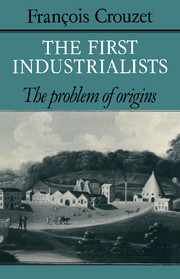1 - The Industrialist: A New Man
Published online by Cambridge University Press: 25 October 2011
Summary
An industrialist can be summarily defined as an individual who is the head (or one of the heads) of a large industrial undertaking – the meaning of ‘large’ being liable to vary according to period and place; he must be the owner of a significant part of the firm's capital and he must be actively involved in its management. This definition will be elaborated and refined later, but will suffice for the present.
The main point of this chapter will be that the industrialist was a new type of businessman, which emerged during the Industrial Revolution. He can be seen as either the engine or the product of the latter. But whether industrialists made the Industrial Revolution or were created by it is a chicken-and-egg controversy which will not be entered into here. Suffice it to quote Peter Mathias's wise remark that they ‘join the circle of other factors in economic growth as part cause and part effect, a dependent attribute and a creative part of industrial progress’, and to add that, in my view, entrepreneurship is not a cipher but a major determinant of growth, both at the micro- and at the macro-economic level. I would be prepared to generalize to the rest of Britain T.C. Smout's remarks about the pioneer industrialists of Scotland, who, by ‘laying the foundations of a new Scottish economic order… affected the lives of all who lived since. There has never been any small band of Scots who by their initiative and enterprise made so great an impact on the history of their nation.’
- Type
- Chapter
- Information
- The First IndustrialistsThe Problem of Origins, pp. 1 - 19Publisher: Cambridge University PressPrint publication year: 1985
- 1
- Cited by

